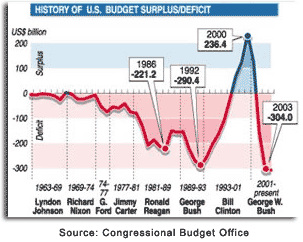"The ideas of economists and political philosophers, both when they are right and when they are wrong, are more powerful than is commonly understood. Indeed the world is ruled by little else. Practical men, who believe themselves to be quite exempt from any intellectual influences, are usually the slaves of some defunct economist."- John Maynard Keynes¹
Deficit Spending
Deficit spending occurs when a government, business, or individual's spending exceeds income. The practice also is called a deficit, or budget deficit, the opposite of a budget surplus.
Government, companies and households sometimes indulge in deficit spending, but with a plan to repay the debt, plus interest charges, over time. This technique is a standard government and business practice, but personal finances managed this way often end up forcing an individual into bankruptcy and poverty. Rules for repayment are different for individuals, business and government.
The federal government, along with most governments around the world, operates on budgets based on economic science — "the dismal science," as one wag put it. Economics is not "voodoo" — George Bush Sr.'s famous put-down of Ronald Reagan's fiscal policy notwithstanding. At the same time, economic science is theoretical and much like quantum mechanics,² elusive and often not directly provable. Fiscal policy,³ based upon economic science, is used to manage America's economy.
The American economy
America's money-credit system is a "flexible economy;" that is, various elements or controls are used to subtly manipulate the system. The following federal government agencies create and manage the world's most complex and highly regulated monetary system:
Controversies, confusion — even conspiracy theories — abound regarding America's money and deficit spending. Regarding the latter, if the mechanisms underlying America's economy had been rigged by a handful of powerful individuals, America would likely not have grown and prospered.
 Deficit spending is one of numerous tools used by the federal government to manage the world’s largest economy — the largest in history. By the use of such credit and financial instruments as interest rates, Treasury bills, bonds, tariffs and currency valuation, governments influence a modern national economy. Control of inflation4 and the productivity of the American economy is determined by fiscal policy.
Deficit spending is one of numerous tools used by the federal government to manage the world’s largest economy — the largest in history. By the use of such credit and financial instruments as interest rates, Treasury bills, bonds, tariffs and currency valuation, governments influence a modern national economy. Control of inflation4 and the productivity of the American economy is determined by fiscal policy.
American fiscal policy is regulated by the Federal Reserve System, commonly known as "The Fed." The Fed was created by the congress through the Owen-Glass Federal Reserve Act in 1913, during the Wilson Administration. Contemporaneously, the U.S. eventually achieved the greatest stability and growth in human history.
A deficit stimulates consumer demand, but that is not all it does, nor is it the only tool used to manage the economy. Private investment is stimulated by targeted tax relief or manipulation of import/export tariffs that increase the ability of the economy to supply output in the long run. In addition, if the government's deficit is spent on infrastructure, basic research, public health, and education — that sort of investment can increase output in the long run. Finally, the high demand that a government deficit can stimulate may actually allow greater growth of supply, following Verdoorn's Law,5 an economic theorem.
The following is an October 2005 statement by the General Accounting Office:
"Over the next few decades, the nation’s fiscal outlook will be shaped largely by demographics and health care costs. As the Baby Boom Generation retires, federal spending on retirement and health programs — Social Security, Medicare, and Medicaid — will grow dramatically. A range of other federal fiscal commitments, some explicit and some representing implicit public expectations, also bind the nation’s fiscal future. Absent policy change, a growing imbalance between expected federal spending and tax revenues will mean escalating and ultimately unsustainable federal deficits and debt."
Conclusion
A government budget deficit, along with such other fiscal tools as credit, can stimulate the economy, resulting in business activity and profitability. A deficit can help to create business and investor optimism along with more employment opportunities. But too much of a good thing can also fuel a rise of inflation. Deficit spending may also create a rise in unemployment, but lower the inflation rate. The object is to maintain a balance.
²Quantum Mechanics: The branch of physics that is the study of the motion of particles in the micro-world of atoms and nuclei. A description of the behavior of matter and energy on a small scale — a scale small enough that the discrete or discontinuous nature of all matter and radiation becomes noticeable.
³Fiscal Policy is defined as; the current operating instructions for the economy, defined by strict rules, that may change from day to day as required, much like driving a car through the rear-view-mirror.
4Inflation: Monetary inflation is kind of tax with which government — by expanding the money supply — transfers wealth from its people to itself. It also results in the transfer of enormous amounts of wealth from the hands of ordinary people to the hands of those speculators shrewd enough to take advantage of the price volatility inflation causes in the markets.
5Verdoorn's Law in economics is essentially the difference between Fiscal Policy and estimated Gross Domestic Product, within an actual set of circumstances. If the latter falls between one percent and five percent it is said to be out of proportion and thus disqualifying it from Verdoorn's Law.